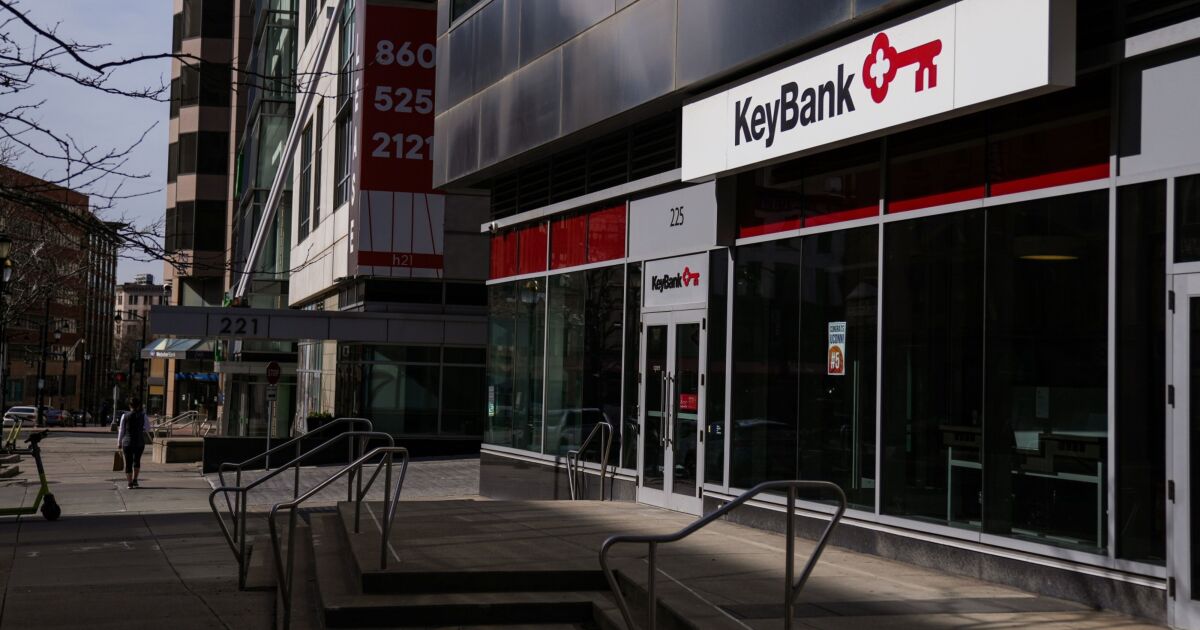KeyCorp CEO Chris Gorman is set to receive a one-time bonus of $7.57 million in stock awards following the completion of the Bank of Nova Scotia’s minority-stake investment in the Cleveland-based company.
You are viewing: KeyCorp CEO Gorman to receive $7.5M bonus after Scotiabank investment
Gorman and four other high-ranking executives were granted a combined $16.71 million in performance-based equity awards that will vest in two years, as long as Key meets certain capital requirements and earnings goals between Jan. 1, 2025, and Dec. 31, 2026, the company said Tuesday in a late-afternoon regulatory filing.
The awards are aimed at boosting top executives’ stock ownership levels to “retain the talent the Company needs to continue to generate and deliver long-term shareholder value from the Scotiabank strategic minority investment,” the company said in its filing.
The disclosure came shortly before the New Year holiday, and it followed the completion of the second leg of the investment by Toronto-based Scotiabank. Scotiabank now owns approximately 14.9% of Key following its $2.8 billion investment. Analysts foresee the possibility of an eventual full-on acquisition as Scotiabank looks to expand its U.S. footprint.
Scotiabank’s deal with Key, announced in August, came after the Ohio-based company struggled to hit profitability targets in 2023 and during much of 2024.
The added capital from Scotiabank has helped Key rework its balance sheet and improve its profitability, primarily by selling some investments that had suffered when interest rates rose.
But the deal came at a cost to existing shareholders, whose position in the previously struggling bank was diluted under the deal, said one industry observer who declined to speak publicly about the bank.
See more : 2024 was the year where AI finally started returning on investment
On the other hand, that observer said, Key executives were able to negotiate a premium payment from Scotiabank, a feature that required some behind-the-scenes skills and relationship building. Key also structured the deal in a way that allowed it to close more quickly — and was more palatable to U.S. regulators — than would have been the case for a complete acquisition by a Canadian bank.
A Key spokesperson declined to comment further on the bonuses to top executives but noted that the awards are separate from the company’s long-term incentive compensation programs.
Gorman’s total pay in 2023 was nearly $10.1 million, according to the company’s most recent proxy filing, with $1.2 million in base salary and the remainder coming from Key’s incentive programs.
At nearly $7.6 million, the new stock-based bonus for Key’s CEO is “fairly substantial,” said Bert Ely, a longtime banking consultant. He declined to comment on whether the bonus is warranted, saying that the answer to that question will depend on whether the Scotiabank deal delivers the benefits that executives have promised.
“You’ve got to wait a couple of years to see,” Ely said.
KeyCorp, the $189.7 billion-asset parent company of KeyBank, has said the added capital gives the bank more room to play offense as it wins clients from competitors. The company has also put some of the new capital to work by restructuring its bond portfolio, which took a hit and dragged on its earnings when interest rates rose.
In September, Key sold about $7 billion of lower-yielding bonds and replaced them with more attractive options, a factor that will improve its profitability. In its Dec. 31 filing, the bank said it also sold another $3 billion in lower-yielding investment securities, terminated about $3 billion in cash flow hedges and purchased higher-yielding securities.
The most recent sale will result in an after-tax loss of about $700 million in the fourth quarter, the bank warned in its securities filing. Key is expected to report its overall net income for the last three months of 2024 on Jan. 21.
See more : Bond Forecast: Pros See 10-year Treasury Yield Falling Modestly In 2025
In the third quarter, the company reported a $447 million net loss after recording a $737 million charge from selling bonds.
Gorman’s bonus is the highest among the five executives named in Key’s filing.
Chief Financial Officer Clark Khayat is set to receive a bonus of $2.93 million and Amy Brady, the company’s chief information officer, will receive $1.62 million, according to the filing.
Andrew “Randy” Paine III, head of institutional banking, has been awarded $2.61 million, and Chief Human Resources Officer Angela Mago has been awarded $1.98 million, the bank said.
Each of the bonus awards are target awards. The maximum payout level is 150% of the target amount, Key said in its Dec. 31 filing. Shares to be vested are subject to a one-year holding period.
In its regulatory filing, Key also said that two Scotiabank-designated individuals have joined Key’s board of directors — Jacqueline Allard, the group head of global wealth management at Scotiabank, and Somesh Khanna, co-executive chairman of Apexon and the former co-leader of the global banking and securities practice at the consulting firm McKinsey.
Allard will serve on the board’s technology committee, and Khanna will join the risk committee, Key said. Both of them will be up for reelection at Key’s 2025 annual shareholder meeting.
Key’s board now has 15 directors, up from 13 previously.

